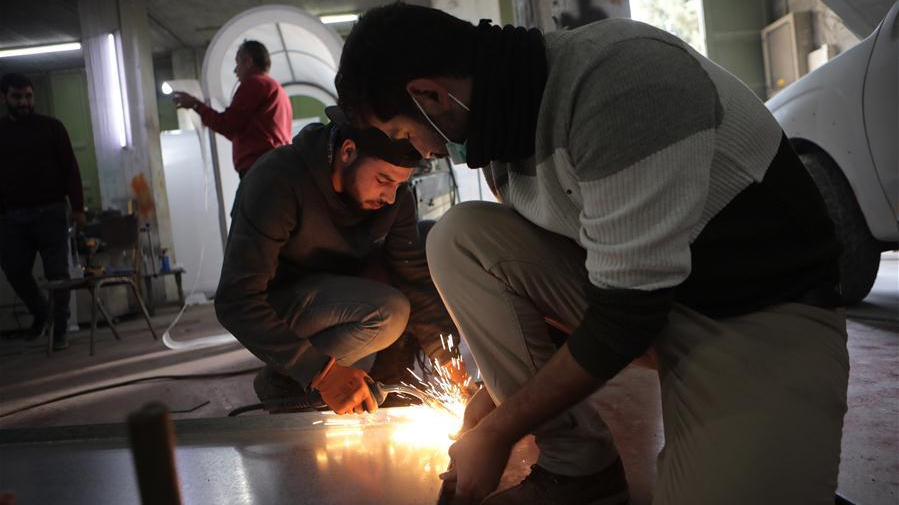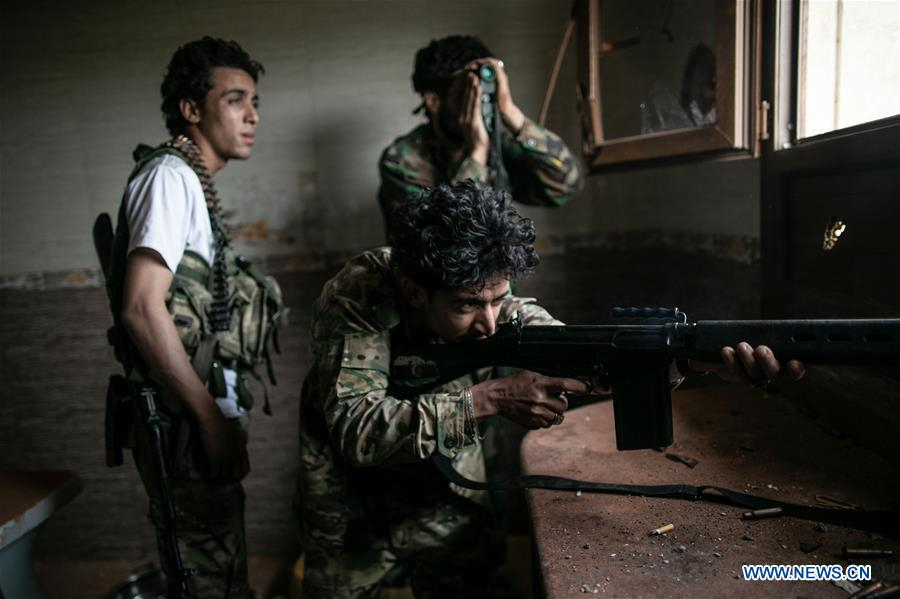
Palestinian engineer Tariq Al-Najjar (R) works on making a mobile sterilization chamber which sprays disinfectant, at his workshop in the West Bank city of Hebron, April 2, 2020. /Xinhua
Palestinian engineer Tariq Al-Najjar (R) works on making a mobile sterilization chamber which sprays disinfectant, at his workshop in the West Bank city of Hebron, April 2, 2020. /Xinhua
Editor's note: Hamzah Rifaat Hussain is a former visiting fellow at the Stimson Center in Washington, and currently serves as assistant researcher at the Islamabad Policy Research Institute (IPRI) in Pakistan. The article reflects the author's opinions and not necessarily the views of CGTN.
Reports of Israel striking Hamas after a rocket fire from Gaza highlights the risks that escalation of longstanding conflicts pose in dealing with the COVID-19 pandemic globally.
Infected states in South Asia, the Middle East and North Africa are confronting conflict zones which are characterized by warring factions vying for influence and domestic populations ravaged by poverty, alienation, dilapidated health infrastructures and lack of financial resources. Tackling these humanitarian quagmires requires the cessation of violence from all parties to the conflict and the implementation of ceasefires, which if not necessitated urgently, puts vulnerable populations such as the Rohingya refugees or Palestinians in siege at a heightened risk of contracting COVID-19.
The United Nations has called for ceasefires across all regions with a cessation of violence from all parties as a prerequisite for curbing the pandemic.
Developments in conflict torn areas such as Afghanistan, however, point to an alarming trend with the Taliban in the Post Doha Peace Deal scenario refusing to speak to the Ashraf Ghani government's negotiating team.
This refusal follows a spike in attacks within Afghanistan which have partly been claimed by the Taliban and risks prolonging a conflict which requires a sustainable solution for regional peace. Afghanistan, currently, has over 200 cases of COVID-19 and without a political settlement to its disputes, managing the pandemic for its war torn population would continue to be an uphill task.
No more is this evident than in war-torn Yemen where the humanitarian crisis is both acute and alarming with thousands of Yemenis displaced and child malnutrition being ubiquitous.
An estimated 24.1 million or two thirds of its population need dire humanitarian support in the country with its population suffering from a severe cholera outbreak making headlines across the world.
Yemen's health care system is also overwhelmed due to constant attacks on hospitals and the influx of patients, which contributes to its capacity issues. Since 2015, the country has been confronting the constant bombardment of its population by the Gulf Cooperation Council resulting in retaliatory strikes by Houthi rebels on Saudi territory.
The recent airstrike in Riyadh by the rebels comes at a critical juncture as Saudi Arabia is witnessing a spike in COVID-19 cases and implementing strict quarantine and social distancing measures to curb the outbreak.
Airstrikes in the Kingdom also coincide with suspension of flight operations and bans on prayers at the two Holy Mosques. Further exchange of fire and violations of territorial sovereignty by either side would compound efforts to curb the pandemic and prove to be disastrous for war torn populations.

A fighter of UN-backed Government of National Accord (GNA) fires during clashes with Libyan National Army (LNA) at Ain-Zara front line in Tripoli, Libya, April 2, 2020. /Xinhua
A fighter of UN-backed Government of National Accord (GNA) fires during clashes with Libyan National Army (LNA) at Ain-Zara front line in Tripoli, Libya, April 2, 2020. /Xinhua
In North Africa, crisis-torn Libya is no exception to dire need of implementing ceasefires. Cases in Libya have been reported in times when the UAE backed Khalifa Haftar's Libyan National Army continues to be at loggerheads with the Government of National Accord which is leaving an indelible mark on the Libyan population and contributing to the refugee influx in Europe. A breakdown in negotiations in Libya could result in migrants arriving on European shores compounding ongoing efforts to deal with COVID-19 for the respective authorities. The health care machinery in Libya has already been exhausted since the fall of Muammar Gaddafi and would have to cater to war-torn populations which is a cumbersome task.
Similarly, in the Levant, Gaza's health care system is also severely impacted by the Israeli siege and shortages of medical facilities for its domestic population was reported even prior to the pandemic arriving. An immediate cessation of violence with international pressure on Israel to desist from attacking the occupied West Bank and Gaza provides an opportunity for stricter quarantine measures to be implemented which would aid in flattening the pandemic curve in the Palestinian territories.
Famine, cholera, malnutrition and waterborne diseases also characterize populations torn apart by ethnic, sectarian, political, and religious conflicts.
A prime example are the Rohingya refugees currently residing in the Kutupalong camp in Bangladesh who continue to be at risk for communicable diseases since fleeing from Myanmar's Rakhine state. These refugees are vulnerable to a whole host of diseases which make them ripe for COVID-19 to take its toll within their precincts. Should Bangladesh be pressurized internationally under pandemic compulsions to repatriate the Rohingya back to Myanmar, the possibility of a resumption in violence in the Rakhine State looms large, which would be catastrophic in the fight against the pandemic in the camp and the region.
Catastrophe and calamity has also beset Kashmir. The occupied territory has undergone a complete lockdown since August 5, 2019, when the Narendra Modi led BJP government in India scrapped Article 370 and 35A of the constitution and curbed civil liberties by abandoning the valley's special status.
What ensued was a complete lack of access to medicines and food supplies for its population due to a prolonged curfew resulting in Kashmiri's being deprived of their basic rights. Without pressurizing New Delhi to lift the curfew, the international community runs the risk of COVID-19 cases becoming ubiquitous in an occupied territory stripped off of access to medical supplies which would have severe economic, political, and humanitarian implications.
Research suggests that immune systems of populations and the presence of diseases in individuals are key variables in order for COVID-19 to become a potent force. Immune systems are greatly compromised in conflict torn populations, which include the Rohingya refugee camp in Kutupalong as well as localities in Libya. The urgent need for political accommodation, negotiated settlements with the cessation of violence as an imperative is critical. Ceasefires are definitely the need of the hour.
(If you want to contribute and have specific expertise, please contact us at opinions@cgtn.com.)